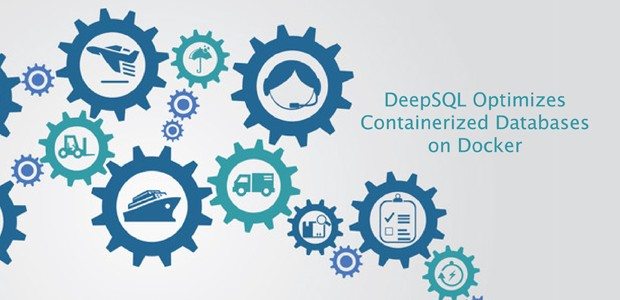Most apps aren’t much use without a database running behind them. Deploying, maintaining and scaling a database in a dynamic environment like a Docker container ecosystem, however, is a Herculean task. DeepSQL thinks it has the solution, though:
Containerized apps may be the engine that drives business these days, but data is the fuel that keeps the engine going for many apps. The need for containerized data has been a challenge because the existing database solutions aren’t designed to work efficiently with containers. Deep Information Sciences thinks it has the solution, though, with Docker support for DeepSQL.
Containers have revolutionized the way organizations develop, deploy, and maintain applications, but containerized databases are a challenge. Running a MySQL database in a Docker container results in poor performance and scalability limits. The MySQL database must also be continually and manually reconfigured to adapt to the changing container environment. Now DeepSQL can be used with Docker to address those issues.
The Deep Information Sciences website describes DeepSQL as a solution that uses the popular relational MySQL database model and API but with a different approach that makes it highly scalable and adaptive to changing business needs. “DeepSQL uses machine learning to continually and automatically adapt to physical, virtual, and cloud environments, while continuously self-optimizing based on the volume, variety, and velocity of workload data.”
Microservices architecture and container environments are very dynamic and fluid—which is why just putting a traditional database into a container isn’t very effective. The continuous adapting and self-optimization of DeepSQL removes much of the burden of managing databases in a container environment and frees developers to focus on creating innovative, compelling apps instead of constantly reconfiguring the database.
Deep Information Services shared some of the features and capabilities of DeepSQL containers in Docker:
• Spin up DeepSQL instances in Docker in nine seconds or less, and dynamically scale up or down
• Enhance Database-as-a-Service offerings by enabling them to perform at much greater speed across multiple workloads
• Reduce IOPs for a given workload by 80 percent
• Realize 60x faster data ingest with indexing
• Reduce storage footprint by up to 90 percent without sacrificing performance, using out-of-line data compression
• Achieve 50x greater performance by minimizing locks and wait states to maximize CPI throughput
• Handle both OLAP and OLTP workloads even at extreme scale (i.e., 1 trillion rows), with millisecond level response times.
Read the full post on ContainerJournal: DeepSQL optimizes containerized databases on Docker.
- Retail Under Fire: Why Hackers Love Shopping Season - August 4, 2025
- Rethinking Compliance as a Strategic Advantage in 2025 - July 28, 2025
- Review: EcoFlow DELTA Pro 3 Portable Power Station - July 21, 2025




Comments are closed.